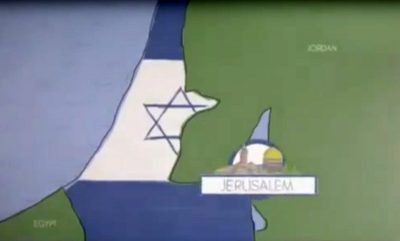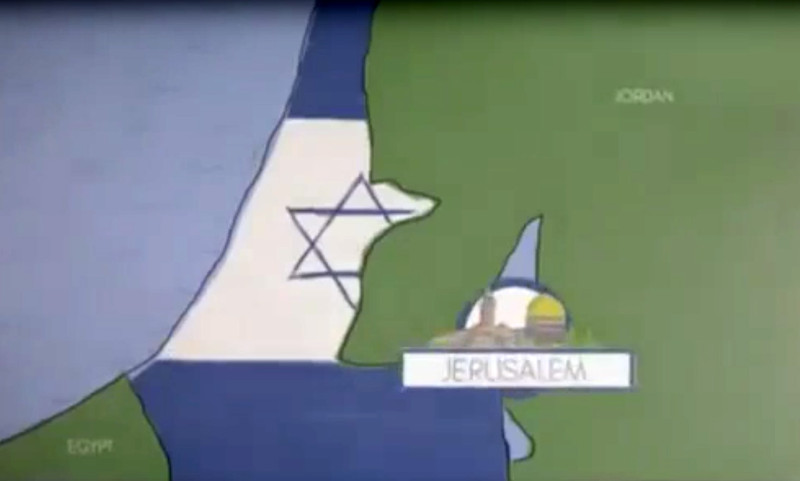Misleading Map of Israel Raises Questions About BBC Impartiality, Erases Palestine Completely

Featured image: A map used in BBC’s Hairy Bikers series erases Palestinians completely.
The BBC has admitted to producing a misleading map of Israel in which Jerusalem is included, the occupied West Bank is annexed to Jordan and Gaza no longer exists.
The map was produced as a graphic for an episode of BBC Two’s Hairy Bikers cookery series entitled “Chicken and Egg,” broadcast at the end of last year.
In the episode, the motorcycling cooks visit Israel and Jerusalem – though the status of the eastern part of the city as occupied territory is not acknowledged – to learn about local chicken and egg dishes. These are all referred to as “Israeli,” even though they include platters which are clearly Arab and North African in origin, including shawarma, shakshuka and couscous.
The map was spotted and challenged by viewer Elizabeth Morley, who then spent the next three months trying to force the BBC into an admission.
In the map, used at the beginning of the episode to illustrate where the two bikers went, the West Bank is incorporated into Jordan, while Gaza has become part of Israel. The Israeli flag is stamped over where Gaza used to be, while an enlarged Jordan is colored in green.
After a few seconds, Jerusalem is added – as a unified city – into Israel. In this fantasy BBC map, the new Jerusalem is nowhere near its actual location, split along the armistice line between the West Bank and Israel. Instead, an illustration indicating the location of the city hovers over the the Dead Sea.
The BBC’s message to its viewers appears to be that Jerusalem, all of it, belongs to Israel, and there is no such thing as Palestine or Palestinian land.
Indifference
Morley told The Electronic Intifada that she lodged an official complaint with the BBC about the map because it was “false, showing not Israel but Israeli wishful thinking, whereby all traces of Palestinian existence had disappeared.”
She added:
“There was no West Bank, no East Jerusalem, no Gaza. And, for that matter, no Golan Heights” – Syrian territory occupied by Israel in 1967.
The BBC responded to Morley’s complaint with indifference in emails seen by The Electronic Intifada. Neil Salt, of the BBC’s Complaints Team, stated:
“… this series is about poultry … it’s not about the political aspects or conflicts of a country.”
He added:
“This was a simplified map aiming only to show the rough geographical locations (not the political aspects) of the sites the Hairy Bikers were visiting … We hope this clarifies any concerns you had.”
After Morley complained again, Brian Irvine, also of the Complaints Team, wrote back in a similarly dismissive fashion:
“… we didn’t feel that a detailed map of the Middle East was required for this program.”
Only after Morley escalated her complaint did she receive an acknowledgement – nearly four months after the program was first aired – that the BBC had breached its own editorial guidelines.
The map was “not accurate,” Fraser Steel, head of Editorial Complaints, wrote. The inaccuracy could not be defended “on the basis that the program was primarily about cookery … And I’m therefore proposing to uphold your complaint,” he added.
Something rotten at the BBC
Yet this is not the first time the BBC have used maps that were “not accurate,” maps that mirror Israel’s view of land ownership in the region.
In 2014, BBC Online created and frequently used a map in which it had moved Jerusalem away from the West Bank and placed it wholly inside Israel.

A deceptive map published on the BBC’s website. (BBC)
And, in 2010, a Top Gear Middle East special used maps of the region which had Israel marked on them, but not the West Bank or Gaza, despite that the program’s three presenters drove into Bethlehem, a city in the West Bank. On that occasion, the BBC Trust justified the map to complainants on the grounds that Top Gear is “an entertainment program,” not a political one.
Maps, however, are not innocuous. They are tools of power, used by states to assert territorial rights often over native peoples.
Israel knows that maps influence how people see and understand the world, and so its tourism ministry funds ads which depict all the land which was historically Palestine as being Israel. Gaza and the West Bank do not exist on these maps.
Is the BBC trying to manipulate its audiences in a similar manner? To persuade them to see Israel as Israel wants to be seen? To forget about the Palestinians?
These are questions the BBC needs to address if it does not want a reputation for pro-Israel bias.
The BBC’s finding will be published on its website at a later date.
This episode of Hairy Bikers is due to be repeated by the BBC on 22 February. If the same map is used, this will make a mockery of the broadcaster’s editorial guidelines and of the complaints process, which has determined the map to be in breach of those guidelines.


